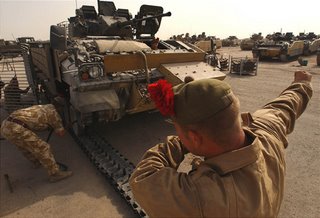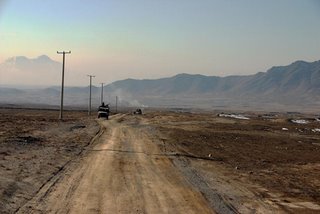 And so to that defence debate held in the Commons last Thursday.
And so to that defence debate held in the Commons last Thursday.While we have been "banging on" about this on this blog, what perceptive readers will find is that the most significant issue to emerge from this debate is that the process itself transcends the subject matter. The way the subject material was handled actually provides a graphic illustration of how the conspiracy of silence in our Parliament over European Union issues continues.
To develop this theme, we need to look at specific aspects of the opening speech from the secretary of state for defence, Des Browne, a man new to his post and without any background military experience. He was, therefore, wholly reliant on his brief from his civil servants and was thus parroting what he has been told.
 The touchstone issue, of course – for this blog – is the "Snatch" Land Rover. This subject is first introduced into the debate by way of an "intervention" by Mark Pritchard, the newly elected Conservative MP for the Wrekin. He asks the secretary of state, in respect of the promised review of armoured vehicles in Iraq and in Afghanistan, "whether Warrior armoured vehicles be supplied to the front line, where there is a demand for them, thereby reducing casualties resulting from Snatch Land Rover use?"
The touchstone issue, of course – for this blog – is the "Snatch" Land Rover. This subject is first introduced into the debate by way of an "intervention" by Mark Pritchard, the newly elected Conservative MP for the Wrekin. He asks the secretary of state, in respect of the promised review of armoured vehicles in Iraq and in Afghanistan, "whether Warrior armoured vehicles be supplied to the front line, where there is a demand for them, thereby reducing casualties resulting from Snatch Land Rover use?"Before getting on to our Des Browne, Pritchard's intervention has to be marked down as utterly fatuous and unhelpful. It is a line that has also been pursued by the egregious Sean Rayment in the Sunday Telegraph and needs a little exploration.
The Warrior Mechanised Infantry Combat Vehicles (MICV) are tracked armoured vehicles designed specifically to carry sections of infantry into battle alongside main battle tanks, providing the infantry support without which tanks cannot operate. Moreover, they were designed specifically for the European theatre for action against Warsaw Pact forces.
As such, these are not patrol vehicles – they are troop carriers. Visibility for the troops carried is poor and they are not able to participate in the action until dismounted. Further, as tracked vehicles, they are noisy and uncomfortable – important factors when troops are carried for long periods – and, being built for the European theatre, they lack air conditioning. Being tracked, they are relatively slow and, crucially, require a high level of maintenance, as the tracks wear out very quickly in adverse conditions.
Very recently, we have seen a report from Canadian forces operating in Afghanistan, recounting the enormous toll that operations are exacting on equipment; we have first-hand accounts from British troops in Iraq about how the increased use of Warriors in that theatre is imposing acute maintenance burdens which will shortly reach a crisis point; and there are many public domain narratives which convey the concern of US over the extraordinary toll routine operations in Iraq are taking of mechanical equipment.
 Whatever the need for improved armour in both Iraq and Afghanistan, therefore, Warriors are not the answer. We are using them simply because we have them – and nothing else – but, given the huge distances they would have to travel in Afghanistan, they would be a liability. Pritchard, had he taken the time and effort to research the issue, would have known this. But, instead, we get a cheap little intervention that actually misses the point completely – that we do not have a suitable armoured vehicle in either Iraq or Afghanistan for use in counter-insurgency operations.
Whatever the need for improved armour in both Iraq and Afghanistan, therefore, Warriors are not the answer. We are using them simply because we have them – and nothing else – but, given the huge distances they would have to travel in Afghanistan, they would be a liability. Pritchard, had he taken the time and effort to research the issue, would have known this. But, instead, we get a cheap little intervention that actually misses the point completely – that we do not have a suitable armoured vehicle in either Iraq or Afghanistan for use in counter-insurgency operations.Turning now to Des Browne, the man responded by agreeing that "we identified a deficiency in capability as regards Snatch Land Rovers and the fully armoured vehicles and thought that it needed to be addressed", reminding Pritchard of the ongoing review. He then went into a long spiel about the IED threat and the use of armoured vehicles.
Improved armour, he said, is part of the solution and claimed that "additional armoured options" will become available to commanders over the next year. This included the "new patrol vehicle", the Vector (the infamous armoured Pinzgauer), which will enter service in Afghanistan in 2007. In addition, said Browne. "we have already upgraded the protection on Warrior, Saxon and the CVR(T), and we are currently upgrading it on the FV430 vehicle." There, the secretary of state seems to be unaware of his own department's decision to withdraw the Saxon completely. Heedless of this, he then continued:
However, Snatch Land Rovers will continue to be an important option. The Army's approach to its role in Iraq and broadly in Afghanistan - although not on certain tasks - requires a low profile and a highly mobile patrol vehicle that allows troops to engage with local people. As people will have seen from their television screens, paratroopers in Afghanistan prefer to walk the streets of towns there with soft hats on. That is not our decision, but a decision made by their commanders in the light of what they are trying to do. It is clear from the pictures relayed back in recent days that that engagement works in a substantial part of the area for which they have taken responsibility. Larger and significantly heavier vehicles, such as Warrior, might be better armoured, but they are not always suitable for the lower profile and less intimidating manner in which the Army often prefers to operate. That, in turn, feeds into the security of our forces, because their relationship with the people with whom they work is an important component of security.What we have to remember, though, is that, of the four major armies in the two theatres, the Americans, the Canadians, the French and the British, the first three have decided to provide entirely new armoured equipment or upgrade existing equipment. Therefore, what we are seeing is Browne telling us that, beyond unspecified "additional armoured options" and the new and dangerous Pinzgauer – which is a troop transport rather than a patrol vehicle – the MoD, uniquely, does not see the need for re-equipment. The fact is that the MoD has been caught short, committing troops to two highly dangerous theatres without suitable armoured vehicles.
We must remember, however, that equipment - armour and other counter measures - is only one element of protection. According to the experts who have advised me continuously over past weeks, it is only about a third of the story. The rest is down to intelligence gathering, surveillance and proactive operations to disrupt and capture insurgents, and to the tactics that our troops adopt to minimise the risks of successful attack. I am told by experienced commanders that they sometimes choose not to be in a vehicle at all but to walk the streets, which is much safer than being cooped up in a vehicle and provides a degree of flexibility.
Now, you would have thought that an opposition, desperate to score "brownie points", and with a reputation to build and an election to win – whenever it happens – would have made capital out of this. Browne had just presented them with an open goal.
This was left primarily to Liam Fox, who was is next on his feet as shadow secretary of state for defence. But the open goal was ignored. He talked about defence spending, recruitment and retention, the territorial army and the reserves, overstretch and its effect on morale, family accommodation, shortages in the medical services, combat stress, the working condition of troops and the general situation in Afghanistan. But not once in his speech is there any mention of armoured vehicles – not even a passing reference to their deficiencies.
Then, throughout the main part of the debate, this became the dog that did not bark. We were treated to a huge range of issues – even one Labour MP bemoaning the injustices done to the Bevin Boys – the conscripted coal miners during that Second World War – but nothing more on equipment, until it cames to Conservative back-bencher, Ann Winterton. But she went further. She that asked members to cast their minds back to December 1998 during the negotiations on the St. Malo agreement. It was at that time, she said, that the Prime Minister decided that the UK would not join the euro. "In all matters relating to the European Union, there can never be a straight decision. There is always a trade off—that is, a price to be paid. In this instance, the UK conceded and agreed that our forces would be integrated into a European Union defence force".
She continued:
From that time onwards, the Ministry of Defence did not quite know in what direction it would have to commit our armed forces in the future. Would the first priority be to serve the interests of the UK, or to co-operate with the European Union or with the United States of America, or a combination of all three? If the MOD did not know in which direction it was meant to be going, how could members of the armed services second-guess the future? Subsequently, the problems have been exacerbated because the UK is engaged in conflicts in which our troops are committed in Iraq and Afghanistan.Looked at dispassionately, this was an extraordinary speech. Despite her measured tones, Winterton was effectively accusing the government is so obsessed with European integration that it was neglecting the combat army and sending troops to their deaths for want of the right equipment.
It has been well understood that, moving on from the former cold war scenario, changes would have to be introduced and the concept of the future Army structure came to light with its objective of strengthening the medium sector. It is crystal clear that we are without a whole category of vehicles suitable for insurgency work, and this lack has been shown in both Iraq and Afghanistan. The focus and direction of policy has been to prioritise the future rapid effect system, which is an integral part of the European Union rapid reaction force, but which realistically will not be in operation until possibly as late as 2020. Moreover, the whole project falls into a world of fantasy in which the total package requires airlift, electronics, future technology and state of the art communication at a projected overall cost of £6 billion initially, which ballooned almost overnight to £14 billion.
Those sum are all beyond our financial means and are almost just a wish list, but these plans have resulted in us taking our eye off the ball. Rather than concentrating on what is needed now and for the immediate future to enable our armed forces to meet the challenges of fighting insurgents in Iraq or Afghanistan—insurgents who are highly mobile and armed with cheap but deadly weaponry—we are left in a virtual vacuum. We are expecting our forces to operate Snatch 1 armoured Land Rovers from Northern Ireland, which are clapped out and always overheating and breaking down. The No. 2s are just about acceptable, with a little life left in them yet, while the No. 3s are very few on the ground.
The problem is that we are forced to use these old vehicles because there is no alternative, and because of ongoing long- term commitments the MOD is now virtually broke.
…
While our armed forces are placing their lives on the line each and every day on behalf of us all, which they are now doing in Afghanistan as well as in Iraq, it is essential that the Government, through the MOD and Parliament, concentrate on providing what is necessary for the present and for the immediate future. The Prime Minister has spent too much time placing European Union integrationist policy first, rather than ensuring that present day servicemen and women have appropriate and adequate resources and equipment.
If we do not provide our forces with the best that money can buy, rather than some of the present outdated equipment, which is hardly fit for purpose, will it be any surprise if we cannot recruit or retain sufficient high calibre personnel? By spending too much time and energy on the future creation of forces which will eventually be totally integrated within the European Union rapid defence force, the Prime Minister and his Chancellor have sold the pass and limited the choices for the future.
Many commentators believe that the Army of today is being starved of resources in order to feed a fantasy army of the future. I hope that they will be proved wrong, and I trust that the MoD will provide the appropriate equipment for our armed services to allow them to perform their valuable and vital duties.
In the remainder of the debate, one more back-bencher, Tobias Ellwood, the Conservative member for Bournemouth East, did mention equipment but when it came to the summing up, there was not a mention of the European issue. Mark Harper, for the Conservatives, noted that Anne Winterton had "raised the issue of equipment" while Adam Ingram, the minister of state for defence, speaking for the government, simply ignored Winterton's speech. As to Europe, he ignored that as well, although he did take the time out to commend all the speakers, saying: "We have not been in party-political point-scoring mode today".
Thus it is that the conspiracy of silence continues. This is the new conservatism of "Dave", where the Conservative party doesn't "do" Europe any more, while the government blithely ignores any references made by errant back-benchers. And so the chaps all patted themselves on their respective backs, congratulating themselves on what a jolly good debate it had been and went off to the bars, or their offices, or toddled off home – or whatever.
The media, in turn, also ignored the debate and the elephant slumbered on quietly in the corner of the room.
COMMENT THREAD